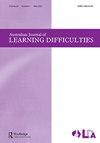Detecting strengths and weaknesses in learning mathematics through a model classifying mathematical skills
IF 1.6
Q3 EDUCATION, SPECIAL
引用次数: 10
Abstract
Abstract Through a review of the literature on mathematical learning disabilities (MLD) and low achievement in mathematics (LA) we have proposed a model classifying mathematical skills involved in learning mathematics into four domains (Core number, Memory, Reasoning, and Visual-spatial). In this paper we present a new experimental computer-based battery of mathematical tasks designed to elicit abilities from each domain, that was administered to a sample of 165 typical population 5th and 6th grade students (MLD = 9 and LA = 17). Explanatory and confirmatory factor analysis were conducted on the data obtained, together with K-means cluster analysis. Results indicated strong evidence for supporting the solidity of the model, and clustered the population into six distinguishable performance groups with the MLD and LA students distributed within five of the clusters. These findings support the hypothesis that difficulties in learning mathematics can have multiple origins and provide a means for sketching students’ mathematical learning profiles.通过数学技能分类模型检测数学学习的优缺点
摘要通过对数学学习障碍(MLD)和数学低成就(LA)相关文献的回顾,我们提出了一个数学学习技能模型,将数学学习技能分为核心数字、记忆、推理和视觉空间四个领域。在本文中,我们提出了一种新的基于计算机的实验数学任务,旨在激发每个领域的能力,并对165名典型的五年级和六年级学生(MLD = 9, LA = 17)进行了管理。对获得的数据进行解释性和验证性因子分析,并进行k均值聚类分析。结果显示了强有力的证据支持该模型的可靠性,并将人口聚类为六个可区分的绩效组,其中MLD和LA学生分布在五个集群中。这些发现支持了数学学习困难可能有多种原因的假设,并为描绘学生的数学学习概况提供了一种方法。
本文章由计算机程序翻译,如有差异,请以英文原文为准。
求助全文
约1分钟内获得全文
求助全文
来源期刊

Australian Journal of Learning Difficulties
EDUCATION, SPECIAL-
CiteScore
1.80
自引率
11.10%
发文量
8
 求助内容:
求助内容: 应助结果提醒方式:
应助结果提醒方式:


